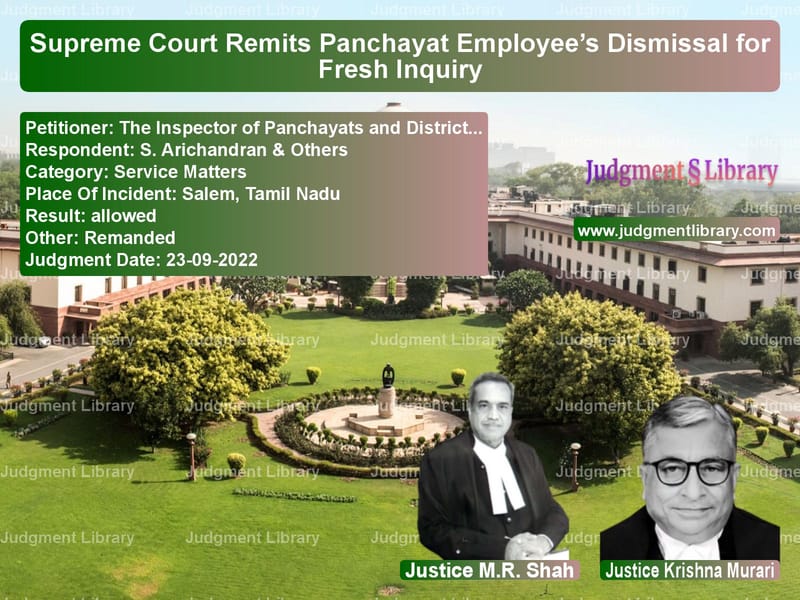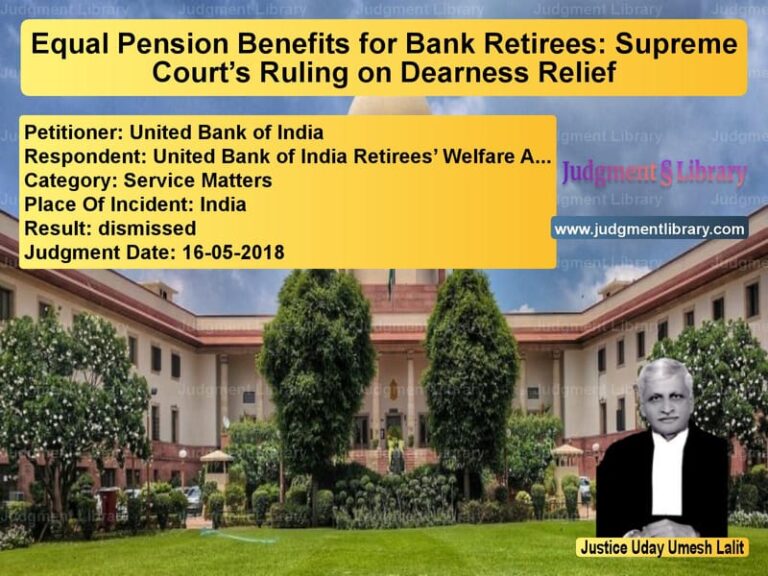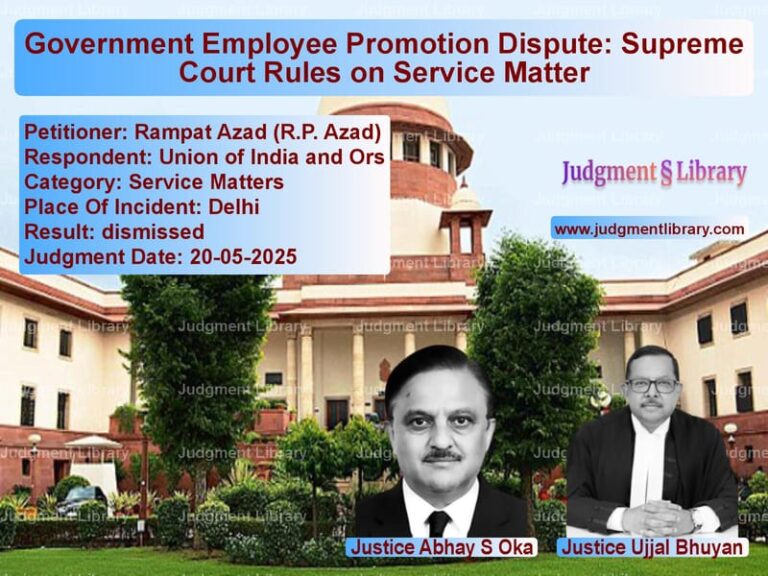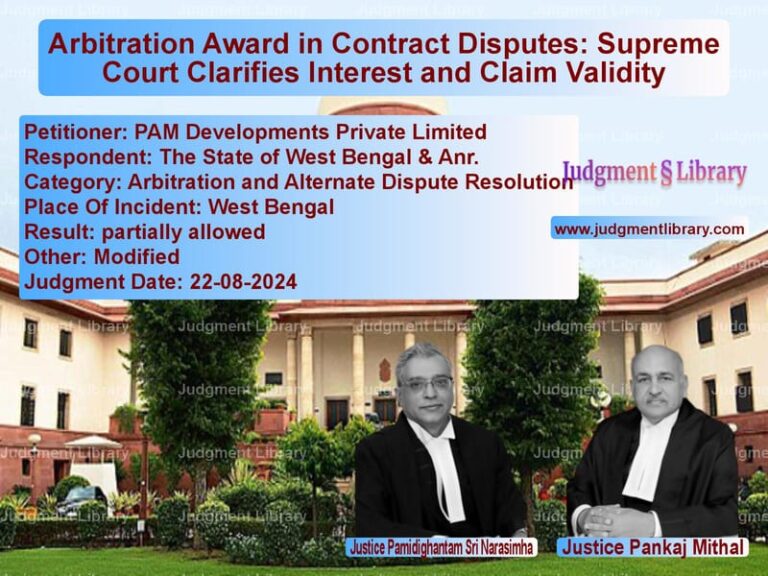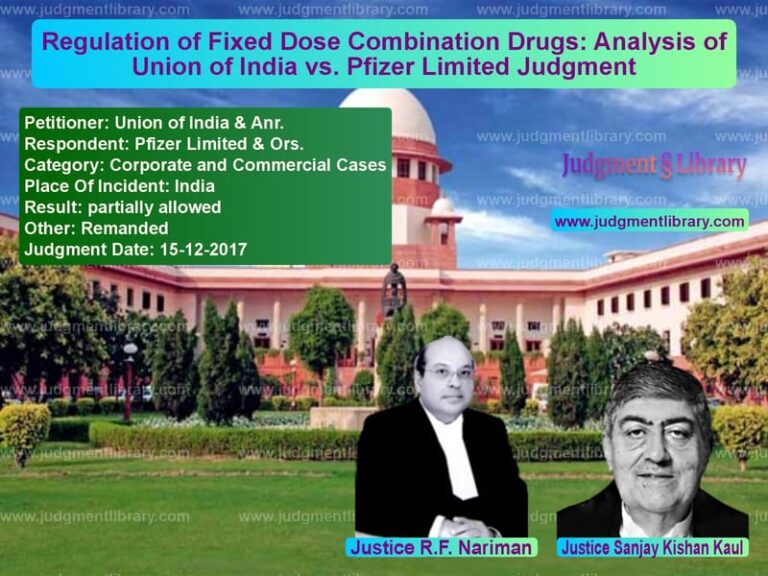Supreme Court Remits Panchayat Employee’s Dismissal for Fresh Inquiry
The Supreme Court of India recently ruled in the case of The Inspector of Panchayats and District Collector, Salem vs. S. Arichandran & Others, addressing the procedural violations in the dismissal of a Panchayat Assistant. The Court set aside the Madras High Court’s order reinstating the employee and directed a fresh inquiry by the Disciplinary Authority.
Background of the Case
The respondent, S. Arichandran, was employed as a Panchayat Assistant in Tamil Nadu’s Samuthram Panchayat. He was accused of misappropriating Panchayat funds in collusion with the former Panchayat President. Following a departmental inquiry, he was dismissed from service on September 25, 2006.
The respondent challenged his dismissal before the Madras High Court, contending that the inquiry had violated the principles of natural justice. The High Court set aside the dismissal and directed his reinstatement with full back wages. Dissatisfied with this decision, the District Collector, Salem, filed an appeal before the Supreme Court.
Legal Proceedings
Arguments by the Appellant (District Collector, Salem)
- The appellant argued that the respondent was guilty of serious financial misconduct and should not have been reinstated.
- It was contended that the High Court should have remanded the case for a fresh inquiry instead of ordering reinstatement.
- The appellant relied on the judgments in Chairman, Life Insurance Corporation of India vs. A. Masilamani (2013) 6 SCC 530 and State of Uttar Pradesh vs. Rajit Singh (2022 SCC Online SC 341), which state that if a dismissal order is set aside due to procedural defects, the matter should be remitted for a fresh inquiry.
Arguments by the Respondent (S. Arichandran)
- The respondent contended that the High Court’s decision was justified since the inquiry was fundamentally flawed.
- He argued that despite a previous High Court ruling directing a proper inquiry, the second inquiry also violated natural justice as he was not given a copy of the Inquiry Officer’s Report before the dismissal order was passed.
- He maintained that there was no financial loss to the Panchayat as the funds were recovered from the former Panchayat President.
- The respondent had suffered financially since 2006, and further prolonging the inquiry would cause undue hardship.
Supreme Court’s Observations
A bench comprising Justice M.R. Shah and Justice Krishna Murari examined the case and provided the following key observations:
1. Violation of Natural Justice
The Court noted that the dismissal order was passed without giving the respondent a copy of the Inquiry Officer’s Report. This violated the principle of audi alteram partem (the right to be heard), making the order legally unsustainable.
2. Reinstatement Was Not the Correct Remedy
The Supreme Court observed that the High Court should not have reinstated the respondent but should have remanded the case for a fresh inquiry:
“Once a dismissal order is set aside due to a violation of natural justice, the proper course is to remit the matter back to the Disciplinary Authority for a fresh inquiry.”
3. Precedents Supporting Fresh Inquiry
The Court referred to its rulings in Rajit Singh and A. Masilamani, where it was held that:
“If an inquiry is found to be defective, the disciplinary proceedings must be continued from the stage of defect, rather than ordering reinstatement.”
4. Limited Interference with Administrative Decisions
The Court emphasized that judicial review in service matters should focus on procedural fairness rather than substituting administrative decisions. It ruled:
“Courts should refrain from ordering reinstatement where the employer has the right to conduct a fresh inquiry.”
Final Verdict
The Supreme Court ruled as follows:
- The orders of the Madras High Court (both Single Judge and Division Bench) directing reinstatement with back wages were quashed.
- The case was remitted to the Disciplinary Authority to conduct a fresh inquiry, ensuring compliance with natural justice.
- The disciplinary proceedings must be completed within six months.
- The appellant (District Collector) was directed to pay Rs. 50,000 as costs to the respondent for the prolonged legal battle.
Impact of the Judgment
This ruling has significant implications for service law and employment disciplinary actions:
- It reaffirms that procedural fairness is crucial in dismissal cases.
- Employers must provide a copy of the Inquiry Report before taking disciplinary action.
- Courts should remand defective inquiries rather than order direct reinstatement.
- The judgment ensures that disciplinary proceedings are not unduly prolonged.
Conclusion
The Supreme Court’s decision in The Inspector of Panchayats and District Collector, Salem vs. S. Arichandran provides a balanced approach to service law disputes. While upholding the importance of procedural fairness, the Court also ensures that government authorities retain the right to conduct disciplinary proceedings when necessary. This judgment sets a precedent for similar cases involving procedural lapses in employee dismissals.
Petitioner Name: The Inspector of Panchayats and District Collector, Salem.Respondent Name: S. Arichandran & Others.Judgment By: Justice M.R. Shah, Justice Krishna Murari.Place Of Incident: Salem, Tamil Nadu.Judgment Date: 23-09-2022.
Don’t miss out on the full details! Download the complete judgment in PDF format below and gain valuable insights instantly!
Download Judgment: the-inspector-of-pan-vs-s.-arichandran-&-oth-supreme-court-of-india-judgment-dated-23-09-2022.pdf
Directly Download Judgment: Directly download this Judgment
See all petitions in Employment Disputes
See all petitions in Disciplinary Proceedings
See all petitions in Public Sector Employees
See all petitions in Judgment by Mukeshkumar Rasikbhai Shah
See all petitions in Judgment by Krishna Murari
See all petitions in allowed
See all petitions in Remanded
See all petitions in supreme court of India judgments September 2022
See all petitions in 2022 judgments
See all posts in Service Matters Category
See all allowed petitions in Service Matters Category
See all Dismissed petitions in Service Matters Category
See all partially allowed petitions in Service Matters Category

